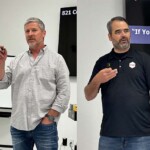AASP/NJ Members Garner Negotiation Tactics and More from Matthew’s Auto Supplies
by Alana Quartuccio
Getting paid for the work you do all comes down to how you negotiate.

The event was open to all AASP/NJ members and featured AASP/NJ President Ken Miller who took to the microphone to share valuable information about contracts and state laws.
“Some people just don’t want to negotiate,” Stephens pointed out. What it comes down to is changing the way the information is presented and the attitude behind it. “It has to evolve from asking for something to telling; I’m telling you what the final bill is going to be.”
Many don’t realize they are working against their own interests and the market when they go about things the wrong way. It all starts with talking to the customer. “If you are afraid of being transparent with your customer, you are essentially negotiating against yourself.”
Stephens admitted he used to wrongly visualize the parties involved as a triangle – the three parties being the shop, the vehicle owner and the insurance company. But there is no connection between the shop and the insurance company. The owner of the vehicle has a policy with the insurer. “Thinking I was connected to the insurance company is a trap that worked against me. I was working against myself. Ultimately, it’s the customer – the vehicle owner – who owes me. The vehicle owner is the person who needs to be involved. Only the customer can motivate the insurance company to do something out of their protocol.”
Documentation is key in negotiations. “A business without documentation is like a body without bones,” Stephens illustrated.
Miller shared his experience with repair contracts, pointing out some of the terms shop owners may want to consider when working with an attorney to establish their own.
Echoing Stephens’ comments about who shop are beholden to, Miller stressed, “I work directly for the customer. My communications with the insurance company are a courtesy to the customer.” It is not automatically the shop’s job to send their repair plan to the insurer. “We can do it on their behalf if the customer authorizes us to do so. That changes the dynamic because now we are doing something else for them. We want to keep ourselves out of that. It’s time to start changing the narrative for how these negotiations happen.”
“A repair contract can be intimidating. Contracts can be hard to read, but it’s vitally important to protect your business and to protect the consumer,” Stephens added.
Engaging the customer and bringing them into the loop is key. “They have the most clout.”
Success starts with first impressions.
“Is your shop well organized?” Stephens asked. “When people walk in, do they see people in our shop looking upset or aggressive? That’s not an inviting way to greet customers. If you have to get your house in order, start there.”
One of the best investments a shop can make is taking the time to get to know the customer. “Customers will come in and say they need an estimate, and I’ll tell them ‘No, you need some advice. You need a collision repair consultation.’ Build a rapport with them. That way, if they do go to a couple more shops and they just get an estimate, they will remember you because of the time you took with them. It’s about cleanliness, presentation up front and taking the time to get to know your customer and what they really need.”
It’s important to remember that “the customer is an insurance adjuster’s kryptonite,” according to Stephens. Sending an email to the appraiser, with the customer CC’d, claim number and last name included, will result in a response. “That is how artificial intelligence (AI) works. When you send it to the general claims insurance email, the AI reads the claim number and last name and dumps it into a file. This is a great way to get your information into their system.”
He also noted that one’s “ego is not your amigo. When we make it about us, it is not going to work for you. The insurance company doesn’t care about [the shop]. Make the negotiation about your customer. Insurance companies are more concerned about upset customers than upset body shops.”
AASP/NJ is grateful to allied members, Matthew’s Auto Supplies and Indasa USA, for opening this event to the association’s member shops at no cost.
Stay tuned to the August issue of New Jersey Automotive for full coverage of the event. For more information about AASP/NJ, please visit aaspnj.org.
Want more? Check out the August 2024 issue of New Jersey Automotive!
